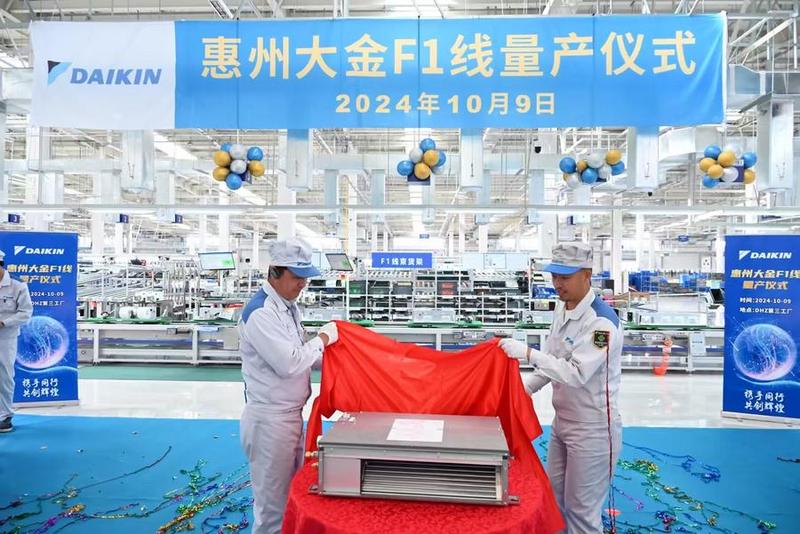
A ceremony of the initial phase of a massive air conditioner production base of Japan's Daikin Air Conditioning (Huizhou) Co Ltd. is held in Huizhou, South China's Guangdong province, Oct 9, 2024. [Photo/Xinhua]
GUANGZHOU — At a new facility in South China's Guangdong province, air conditioners roll steadily off the assembly lines, while robots glide through the aisles transporting products.
This facility is the initial phase of a massive air conditioner production base by Daikin Industries, a leading air conditioning and refrigeration system manufacturer headquartered in Osaka, Japan. With an investment of 1.75 billion yuan ($239.75 million) and spanning 220,000 square meters, the base is set to become Daikin's largest air conditioning production hub in China once fully completed.
In 2024, Daikin celebrated its 100th anniversary and 29 years of operations in the Chinese mainland market. The company currently operates 22 production bases and multiple research centers in cities such as Shanghai and Suzhou, Jiangsu province.
Despite economic challenges, Daikin is among many Japanese firms doubling down on the Chinese market. Data show that Japanese companies have established over 55,000 enterprises in China, with cumulative investment exceeding $130 billion, making Japan one of the leading sources of foreign investment in the country.
"Although China's economy faces some challenges, Japanese companies remain committed to deepening their presence in the market," said Tetsuro Homma, president of the Japanese Chamber of Commerce and Industry in China and executive vice-president of Panasonic Holdings Corp.
According to a survey by the chamber in November, more than half of Japanese companies planned to maintain or increase their investment in China.
"The strong demand in the Chinese market motivated us to increase investment and build the new production base," said Ishikawa Yasuhiro, managing director of Daikin Air Conditioning (Huizhou) Co Ltd. He added that Guangdong's industrial clusters, robust labor market and sound business environment were also factors in the decision.
Daikin is not alone in capitalizing on Guangdong's strategic advantages. Saizeriya, a Japanese chain of Italian restaurants, recently opened a new location in Yangjiang and invested 4 billion yen ($25.33 million) this year in a 12,000-square-meter food manufacturing plant in the province to meet growing demand.
"Thanks to the convenient transportation and logistics network of the Guangdong-Hong Kong-Macao Greater Bay Area, products from our plant can be delivered to restaurants across Guangdong within a day," noted Miyamoto Noriaki, general manager of Guangzhou Saizeriya Co Ltd.
Since opening its first store in Shanghai in 2003, Saizeriya has expanded to over 500 locations across the Chinese mainland. According to its financial report, the combined operating profit of its subsidiaries in Beijing, Shanghai and Guangzhou reached 8.35 billion yen between Sept 1, 2023, and Aug 31, 2024, an increase of 32.58 percent compared to the previous fiscal year.
"The Chinese market significantly contributes to our profits, and our future growth will center on China," Noriaki said, adding that the company is eyeing expansion in cities like Wuhan, Qingdao and Changsha.
Homma emphasized the vast potential for China-Japan cooperation in fields such as green development, energy, digital transformation, supply chain automation, high-end materials and the silver economy.
Taking Panasonic as an example, Panasonic in October broke ground on a new electronic materials factory in Suzhou in a bid to supply advanced materials for China's semiconductor industry.
In response to China's growing silver economy, Panasonic has developed a series of senior-friendly products.
"The Chinese market has unparalleled advantages," said Homma. "It boasts a vast market, a comprehensive industrial and supply chain, strong adaptability to new technologies and immense economic development potential, offering enterprises extensive opportunities for growth."
Xinhua